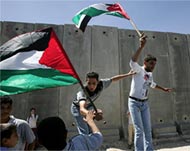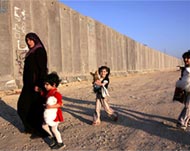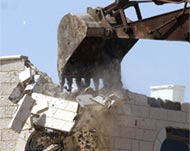Israeli soldiers wounded by Gaza blast
Four Israeli soldiers have been injured after an explosive device detonated near the Netzer Hazani settlement north of Khan Yunus in the Gaza Strip, Aljazeera’s correspondent says.

Palestinian factions had not yet claimed responsibility for the operation, the correspondent added.
Elsewhere, the Israeli army imposed a three-day curfew on al-Mghayir town in the West Bank after a vehicle with settlers came under gunfire on Monday afternoon on Alon road, Aljazeera correspondent Walid al-Umari reported.
The Israeli army immediately closed all the town’s gates, he said.
The army confirmed imposing a curfew on al-Mghayir, saying it was searching for those who opened fire at the settlers’ vehicle, al-Umari added.
Jenin raid
Early on Tuesday, Israeli occupation forces raided the West Bank city of Jenin, al-Umari reported.
Many Israeli military vehicles entered the city, while troops carried out search operations, he added.
The incidents come amid vows by the Palestinian Authority (PA) to take its case over Israel‘s separation wall to the United Nations Security Council.
 |
|
Palestinians fear the wall will |
Palestinians living in East Jerusalem who face being cut off from the rest of the city by Israel‘s giant West Bank barrier fear that they will soon become second class citizens with reduced access to jobs, schools and healthcare.
The Israeli cabinet on Sunday approved plans which will see around 55,000 of the 230,000 Palestinian residents of Jerusalem stuck on the far side of the barrier from September, in a move it justified on security grounds.
The authorities have pledged to ensure that the move will not affect access to services to which Jerusalem resident card holders are entitled, while the city’s mayor Uri Lupolianski said some $1.7 million will be set aside to ensure residents do not lose out.
The PA, however, reacted to Sunday’s announcement by accusing Israel of wanting to shut down discussion over the future status of Jerusalem which has long been one of the thorniest issues of their conflict.
Khader al-Dibs, head of the so-called committee against the wall in Shuafat, said it was nonsense to say that the cabinet decision was devoid of politics.
“They want people to emigrate voluntarily, cut us off from Jerusalem and from al-Aqsa [mosque],” he said in reference to Islam’s third holiest mosque – which lies in East Jerusalem‘s historic heart.
International pressure
The PA urged the world on Monday to press Israel to abide by international rulings that the wall is illegal.
“Israel must implement the international resolutions and we ask all states… to put pressure on Israel to implement these resolutions,” Foreign Minister Nasser al-Kidwa told diplomats and representatives of international organisations in the West Bank.
Such resolutions must also include last July’s non-binding ruling by the International Court of Justice in The Hague that parts of the barrier built on Palestinian land are illegal and should be torn down, he added.
Lack of services
“This wall will mean increasing numbers of unemployed because many people used to go to work in Jerusalem,” said community leader Jamal Awad.
 |
|
Leaders say the wall will limit |
“It will affect their education because many pupils used to attend secondary school nearer the centre of the city after going to primary school in Shuafat, and it will have an impact on healthcare as all hospitals are in Jerusalem.”
Situated 5km east of the city centre, around 20,000 people live in Shuafat – either refugees or the offspring of refugees who lost their homes after the creation of the state of Israel in 1948.
Muhsen Natshe has lived with his wife Majeda for the last decade in the camp but their house is about to be demolished by the Israeli army to make way for the barrier – described as a terror prevention fence by the Israelis but which takes the form of a towering concrete wall around Shuafat.
Bulldozers
Natshe, 42, said he had tried to block the work of army bulldozers but his house looks doomed after receiving a demolition order from the army.
“I can’t sleep at night,” he said. “The Israelis have asked me to apply for compensation and so we can fix on a price but I don’t want their money.”
 |
|
Bulldozers are terrifying children |
His wife Majeda said the noise of the bulldozers and mechanical diggers, which have already begun work in her neighbourhood, was terrifying her children.
“Each time our beds start shaking, we know the bulldozer is approaching for work,” she said.
“They (the Israelis) are tightening the grip around us day after day. What kind of a future or destiny do they want for our children? The sadness and anxiety is spreading through and dominating our lives.”
Israeli support
While the barrier and its route have triggered widespread international criticism, they enjoy majority support from Israelis who have witnessed dozens of bombings over the course of the near five-year Palestinian uprising.
Israel insists the fence has no political connotations and rejects Palestinian claims that the barrier is designed to pre-empt the boundaries of their promised future state.
Israeli Deputy Prime Minister Shimon Peres, meanwhile, said Israel was seeking an additional $2.2 billion in US aid to help pay for the withdrawal from the Gaza Strip and parts of the West Bank.
Israel is the biggest recipient of US aid, getting an annual $2.3 billion for economic and military purposes, but says it needs more money to remove some 9000 settlers and develop the Galilee and Negev desert regions for resettlement.